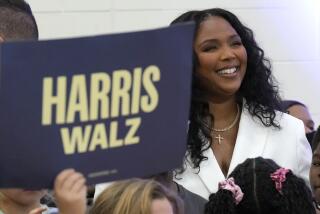Clinton goes long, Obama short
LOGAN, W.VA. — Signaling he has written off today’s West Virginia primary, Sen. Barack Obama took aim this week at the five remaining Democratic contests -- and the fall election, planning a stop in suburban Detroit, home to many “Reagan Democrats” a generation ago.
During a short visit Monday to West Virginia, Obama took a swipe at presumptive Republican nominee John McCain for not backing a Democratic Senate bill on veterans’ benefits. Then Obama dropped by a pool hall before leaving the state -- which Sen. Hillary Rodham Clinton is heavily favored to win.
Clinton spent a long day campaigning in West Virginia, including a stop in Logan, where she argued that she was more electable than Obama.
“West Virginia is a real indicator of where the political winds are going to blow,” she told a cheering crowd. “The goal is to nominate someone who can beat John McCain in November.”
Clinton stressed her economic plan, including her proposals to improve access to affordable healthcare and to suspend the 18.4-cent-a-gallon federal gasoline tax over the summer. McCain supports the tax moratorium; Obama has dismissed it as a gimmick.
But Clinton attacked Bush administration policies more than she did Obama, apparently mindful of Democratic concerns that the candidates not inflict damage on each other.
Obama and Clinton planned to head to Washington today for a Senate vote on a bill to recognize collective-bargaining rights for public safety workers, an important issue for labor. He represents Illinois; she represents New York.
Clinton planned to fly to Charleston for an election-night celebration and then return to Washington. She has announced no campaign events for Wednesday.
Obama appeared Monday in Louisville, Ky., which votes May 20. He will then shift focus to the November battleground states of Missouri and Michigan before resuming the nomination fight in South Dakota and Oregon. Next week he goes to Florida.
On Monday, as he has in recent days, Obama largely ignored Clinton in his speech in Charleston.
But he took direct aim at McCain over what should be a signature issue for the Arizona senator and former Vietnam War prisoner: veterans benefits.
Obama reiterated his support for Virginia Democratic Sen. Jim Webb’s 21st Century GI Bill -- Clinton signed on as a co-sponsor in May 2007, Obama in November -- and criticized McCain for backing what Obama said was a less-ambitious version.
“He is one of the few senators of either party who oppose this bill because he thinks it’s too generous,” Obama said. “At a time when the skyrocketing cost of tuition is pricing thousands of Americans out of a college education, we should be doing everything we can to give the men and women who have risked their lives for this country the chance to pursue the American dream.”
The McCain campaign fired back, noting that Obama voted against an Iraq war spending measure that included $1.8 billion for veterans medical care. Obama opposed the bill because it did not include a plan to bring the troops home.
“It is absurd for Barack Obama to question John McCain’s commitment to America’s veterans, when Obama himself voted against funding our nation’s veterans and troops in the field during a time of war,” said McCain spokesman Tucker Bounds.
McCain and the Democrats also tussled over global warming. McCain, in Oregon, endorsed a “cap and trade” policy to reduce greenhouse gas emissions, and vowed to work through the United Nations to devise a global approach.
Clinton dismissed McCain’s plan as insufficient. “Real leadership means taking this problem head-on with a comprehensive, science-based plan instead of halfway measures. While Sen. McCain’s proposals may be improvement on President Bush’s, that’s not saying much.”
Obama targeted McCain’s voting record. “It is truly breathtaking for John McCain to talk about combating climate change while voting against virtually every recent effort to actually invest in clean energy,” he said.
While the campaigns tossed statements back and forth, Obama continued to gain superdelegates, including Sen. Daniel K. Akaka of Hawaii and Rep. Tom Allen of Maine.
According to an Associated Press tally that includes pledged delegates and superdelegates, Obama has 1,871.5 delegates to 1,697 for Clinton, with 2,025 needed to win.
--
faye.fiore@latimes.com
Fiore reported from West Virginia and Martelle from Los Angeles.
More to Read
Get the L.A. Times Politics newsletter
Deeply reported insights into legislation, politics and policy from Sacramento, Washington and beyond. In your inbox three times per week.
You may occasionally receive promotional content from the Los Angeles Times.











